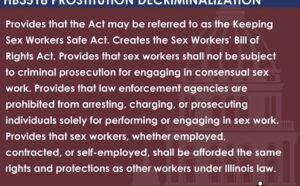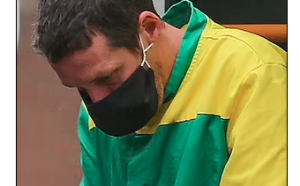The world’s oldest profession has become the province’s unpunished crime, but police say a lack of prostitution-related charges in recent years is part of a shift in focus towards better communication and safety in the sex trade.
“There’s a balance that we have to strike between the needs of the community, and the needs of the street workers,” Royal Newfoundland Constabulary Insp. Jason Sheppard told CBC Investigates.
The RNC and RCMP say they did not lay any charges related to prostitution in Newfoundland and Labrador in 2013.
There was only one charge filed in each of the previous three years.
That includes the entire array of prostitution-related offence — soliciting, procuring, living on the avails, and laws related to “bawdy houses” or brothels.
Supreme Court of Canada decision
In December, the Supreme Court of Canada issued a unanimous decision effectively striking down the country’s anti-prostitution laws, and giving Parliament a year to come up with new legislation — should it choose to do so.
According to Sheppard, the RNC began to shift its approach to how it polices prostitution around 2009.
That year, the RNC laid 16 charges for soliciting.
But police found that a high number of arrests made it difficult to have a rapport with those in the industry.
“What we found is that when you do that, the street workers don’t want to communicate with you, they get afraid of you, they hide away and they won’t have anything to do with you,” Sheppard said.
“So we’ve basically adopted a model where we’re more interested in communication with the street workers. We want to know that they’re safe. We want to know if there are any violent consumers out there. Youth are a priority for us.”
Sheppard stressed that the RNC continues to respond to complaints and carry out surveillance, advising customers to leave certain areas.
“We will take action if we have … exploitation, if we have violence, if we have somebody being coerced or intimidated or extorted and forced onto the street we will certainly in those situations aggressively pursue charges that currently exist.”
Sheppard says the RNC “very rarely” gets involved in the area of escorts or call girls, unless there is a report of an assault or violence. Then police would respond.
“We treat these people exactly the same as we treat any other citizen of the city,” he noted.
The RNC has responsibility for the more urban areas of the province — the northeast Avalon and Corner Brook, along with western Labrador. The Mounties cover the rest.
‘Prosecute those that exploit people’
The federal force’s focus is to “prosecute those that exploit people,” according to RCMP Sgt. Pete McKay.
He says the strategy is to make people understand that they are not the criminal.
“A lot of people involved in that activity you’re seeing are perhaps maybe desperate, or have been coerced or forced in some way to be involved, no matter what level it is at.”
McKay says the RCMP works hard to build trust and open the lines of communication.
“For a lot of people, it’s a big jump to come forward to the police on such an issue. So from our perspective, if we can build that relationship of trust, and get people to come forward and remove them from those situations, get them the support they need.
“And then prosecute those people that would exploit people and take advantage of those who are more vulnerable in society. That’s the goal.”
Nationally, prostitution-related offenses are also on the decline.
According to Statistics Canada, there were 2,077 such offenses reported by police in 2012.
That’s roughly six per 100,000 people, and a 68 per cent drop from a decade earlier.
Only one charge was laid in Newfoundland and Labrador in 2012, according to the RNC and RCMP.
Laws ‘grossly disproportionate’
In striking down laws prohibiting brothels, living on the avails of prostitution and communicating in public with clients, the Supreme Court of Canada ruled last month that the laws were over-broad and “grossly disproportionate.”
“Parliament has the power to regulate against nuisances, but not at the cost of the health, safety and lives of prostitutes,” wrote Chief Justice Beverley McLachlin in the 9-0 decision that noted “it is not a crime in Canada to sell sex for money.”
Laura Winters, a St. John’s-based PhD candidate, has spoken to about 30 male and female sex workers in the city through her research.
“Even though the police may not be making a lot of arrests around sex work in the city, there are real implications to those laws in that people really fear arrest and then that actually impacts how they make decisions on the job and those decisions affect their health and safety,” Winters said.







 TrafficHolder.com - Buy & Sell Adult Traffic
TrafficHolder.com - Buy & Sell Adult Traffic
And yet common sense continues to survive in isolated areas. Hope for humanity of a sort.